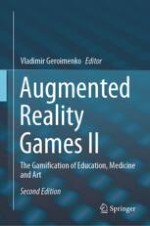2024 | OriginalPaper | Buchkapitel
6. Explorations in Mixed Reality with Learning and Teaching Frameworks: Lessons from Ludus and the Vulcan Academy
verfasst von : Gary Grant, Daniel Della-Bosca, Dale Patterson, Shane Prenzler, Scott Roberts
Erschienen in: Augmented Reality Games II
Aktivieren Sie unsere intelligente Suche, um passende Fachinhalte oder Patente zu finden.
Wählen Sie Textabschnitte aus um mit Künstlicher Intelligenz passenden Patente zu finden. powered by
Markieren Sie Textabschnitte, um KI-gestützt weitere passende Inhalte zu finden. powered by
